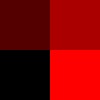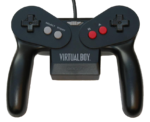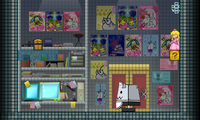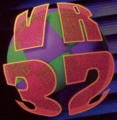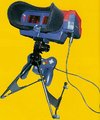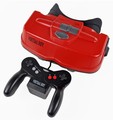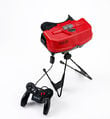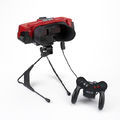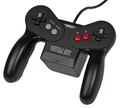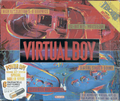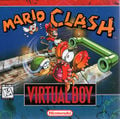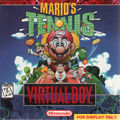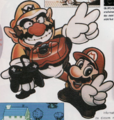Virtual Boy
Template:System-Infobox Template:Quote2
The Virtual Boy is a video game system developed by Nintendo and released in 1995. It consisted of a red box on black legs with a black visor which players would look into for game play. It was created by Gunpei Yokoi, and his 60-headed research team, together with Reflection Technologies. This team worked on the console for over three and a half years. Virtual Boy game images are 3D and are displayed using mirror-scanning technology. They appear on LEDs in four shades of red with a black background. The image is reflected off of oscillating mirrors, which create the apparent thickness of the image. This type of graphics was once referred to by Nintendo as "true 3D". Digital stereo sound is emitted from the self-contained speaker system found on either side of the visor. The console was a commercial failure for many reasons, including its lack of portability and the headaches gameplay caused in a matter of minutes. Concern regarding Nintendo's warnings that the Virtual Boy could cause eye problems also detracted potential customers, though the Virtual Boy would automatically pause every 15 minutes.
It was released early to keep fans occupied during the long wait for the Nintendo 64. Many, however, were not willing to invest in the Virtual Boy with another Nintendo system on its way. It cost $200 US dollars upon first release. Due to its failure in the Japanese and American video game markets, the Virtual Boy was never released in Europe or Australia, and it was discontinued less than a year after its release. It only shipped 800,000 units and sold 770,000 of them during its lifetime.[1]
The Virtual Boy was a fiasco when it was available, but is now a collectors item. The Virtual Boy has an EXT. port that was most likely made to support two-player mode. Games such as Mario's Tennis support this mode, but the cable was never released due to the fact that the system was discontinued so quickly. Years later, the success of the 3D effects Nintendo wanted was fulfilled with the release of the Nintendo 3DS. The Virtual Boy did not have a home console counterpart besides the SNES.
Controller
The Virtual Boy Controller is the standard and only controller for the Virtual Boy. It consists of a and button on the left side, with the and
buttons on the right. One
is found on each side; most of the buttons are reminiscent of the NES's buttons. The controller is also the power source for the system itself via a battery pack on the back of the controller.
Mario games on the Virtual Boy
Released
Canceled

A quote from Leigh Loveday, dated 10th of August, 2001 from the English (and UK based) Rareware website confirmed that a Virtual Boy port of Donkey Kong Country 2: Diddy's Kong Quest was planned, but development didn't get very far from designing the title screen before the project was canceled.
The German magazine Big N claimed that a Virtual Boy installment of the Mario Kart series, tentatively named VB Mario Kart, was in development[2]. The only known media report of it is Big N's August 2000 issue, which listed it among various other canceled Virtual Boy projects.
Tech Demos
Production
When Gunpei Yokoi first had the idea of a Virtual Reality gaming console, he referred to it as "Virtual Utopia Experience".[3] The first concept drawings showed the possibilities of 3D images by displaying two slightly different images using mirrors. During development, the system was codenamed "VR32", meaning "Virtual Reality 32-bit". The early patents of VR32 were made public in 1994, with diagrams showing that the controller was originally going to have three buttons on the right, near the D-Pad. The system was officially announced at the Japan Shoshinkai event on November 15 and 16, 1994[4], where it was first known as "Virtual Boy". The prototype which was unveiled differed from the final version, as the system was colored blue and red, and the blue controller had multicolored buttons. It looked very similar to the future Nintendo GameCube controller. The public were shown how each lens displayed a different image, giving the impression of "True 3D".
Several different pre-production models were later created in Japan, sharing characteristics of both the first prototypes as well as the final design. The plastic was more smooth than the final, and without any writings engraved in it. The adjustment knobs on top are black instead of grey, and the controller reached its final design. North America soon got its own pre-production model. These had the Virtual Boy logo on the side of the system, and the logo on the controller is a bit thicker than on retail units. These pre-production models were given to Nintendo of America's game testers to review Virtual Boy games, and the testers were later allowed to take them home.[5]
Appearances in the Mario series
Super Smash Bros. Melee
A Virtual Boy appears in the shelf, in the room where all trophies are kept. Although the Virtual Boy only appears in the Japanese version of the game, the player can still see it by setting the language to Japanese in the North American version of the game.
Super Paper Mario
Francis has a Virtual Boy in his room in where he also keeps other various Nintendo consoles.
WarioWare: Smooth Moves
During the third stage of Sifty Character microgame, a Virtual Boy is on the shelf.
Game & Wario
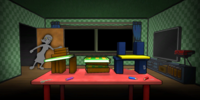
In the minigame Gamer, 9-Volt has a Virtual Boy in his room, next to the television.
Super Smash Bros. for Wii U
In the stage Gamer, based on the minigame of the same name in Game & Wario, the same Virtual Boy can be seen next to the television.
Mario & Luigi: Superstar Saga + Bowser's Minions
The Special Item accessory Secret Specs sprite is designed after the Virtual Boy.
Gallery
Logos
Early design
Final system
A Virtual Boy Wario Land cartridge being inserted into the system
Shipping box
Software
- Www.jpg
Promotional artwork
Cover of a Gamefan Magazine, showing Mario with the Virtual Boy.
References
| Virtual Boy games | |
|---|---|
| Super Mario franchise | Mario's Tennis (1995) • Mario Clash (1995) • VB Mario Land (canceled) • VB Mario Kart (canceled) |
| Donkey Kong franchise | Unnamed Donkey Kong Country proof-of-concept (tech demo) |
| Wario franchise | Virtual Boy Wario Land (1995) |

